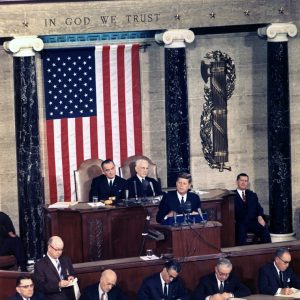by Robert Turner, McCormack Graduate School Senior Fellow

President Kennedy delivers the 1963 State of the Union alongside Vice President Lyndon Johnson and Speaker of the House John W. McCormack. Image: Cecil W. Stoughton
John F. Kennedy’s 100th birthday on May 29 raises complex thoughts and emotions for nearly all Americans.
One element for those of us here at the John W. McCormack Graduate School of Policy and Global Studies is Kennedy’s relationship with our namesake.
Complex doesn’t begin to describe the intertwining of their careers, or the historic impact it had.
Hundreds of books have been written about Kennedy; only one serious work about McCormack, the new biography from Garrison Nelson, a professor at the University of Vermont and the Robert C. Wood Visiting Professor here at the McCormack Graduate School in 2014. “John William McCormack; A Political Biography” is truly an exceptional combination of scholarship, research, and readability. It will doubtless revive interest in McCormack – member of Congress for 43 years, and speaker of the U.S. House for nine years — as one of the most powerful figures in mid-20th century America.
The overall personal relationship between the two men and their families provides rich material, including a variety of Boston political cross-currents. People remember the tough “Teddy-Eddie” Senate campaign of 1962, when Edward J. McCormack Jr., the sitting attorney general and nephew of the speaker, opposed Edward M. Kennedy, brother of the president, who, at 30, was barely old enough to seek the office.
This was the campaign that generated the famous debate joust from McCormack: “with your qualifications, Teddy, if [your name] was Edward Moore, your candidacy would be a joke.” This campaign split Massachusetts Democrats for years, and generated great enmity between the two families. In fact, the strains go back much further. In 1947, when John McCormack, then majority whip in the House, sought support for a petition urging President Harry Truman to pardon James Michael Curley, a McCormack mentor who had been elected to a fourth term as mayor of Boston but was in prison after a mail fraud conviction, only one member of the Massachusetts delegation refused to sign – the freshman John Kennedy.
But fewer people remember that the two served in Congress together from then until Kennedy’s election in 1960, and their careers came together to produce some of the most important political and legislative legacies.
In 1960, Kennedy asked McCormack to be the Convention floor manager of his presidential bid — a move that turned out well as McCormack, through his relationship with his House mentor, Speaker Sam Rayburn of Texas, had a role in getting another Rayburn protégé, Senator Lyndon Johnson, to accept the vice presidential nomination, broadly seen as the linchpin in Kennedy’s electoral victory.
When Kennedy took office in January, 1961, Rayburn was speaker, but his health was declining badly and he left Washington that August. McCormack was majority leader for half of 1961, acting speaker for the rest of that year, and speaker — elected unanimously — in 1962 and continuing through 1970. So McCormack was the leader of the House during nearly all Kennedy’s presidency.
After Kennedy’s death, his supporters and President Johnson focused on passage of Kennedy’s Civil Rights Act. But there was a problem. Early in 1964, the bill was bottled up in the House Rules Committee, chaired by Rep. Howard Smith of Virginia. If there was no action before the campaign season started in earnest, the bill would likely die, but Smith was intransigent. Until, that is, McCormack acted. Although he was a staunch supporter of the seniority system, which gave House chairmen extraordinary power and autonomy, and he was wary that his action would set a dangerous precedent, McCormack took the courageous step of letting it be known that he would support a petition to discharge the Rules Committee and send the bill to the floor. Smith promptly relented, and the bill was on its way. It was signed on July 2, 1964. Quiet machinations that led to a sea change in civils rights in this country.
These are only a few high points of this rich history. McCormack hated publicity and focused almost exclusively on the internal workings of the House. He is doubtless the least-known Washington powerhouse of the 20th century, though Nelson’s book may threaten that.
It is highly likely that, without McCormack, the Civil Rights Act of 1964, Kennedy’s most significant legislative legacy, would not have passed. And it is entirely possible that, had Lyndon Johnson not been persuaded by Rayburn, McCormack, and others to join the ticket, there might not have been any Kennedy presidency at all.
So on JFK’s 100th birthday, we at MGS remember the dashing president, and also take a moment to think of the reclusive but powerful speaker who gave us our name.
